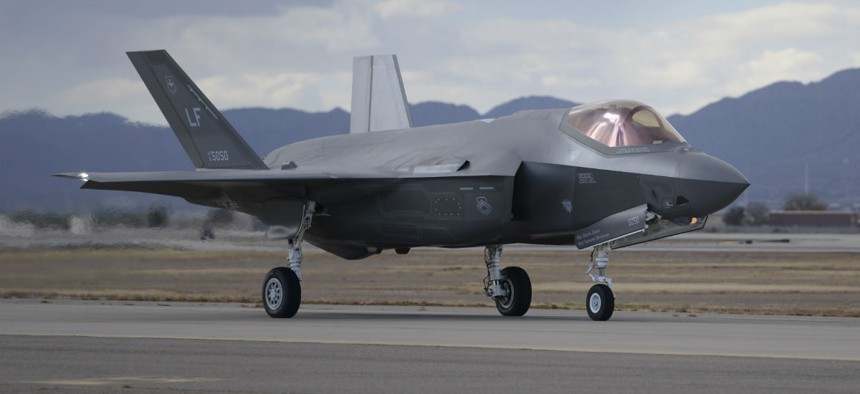
An F-35 returns to Luke Air Force Base, Arizona. Airman 1st Class Ridge Shan / U.S. Air Force file photo
F-35 Will Fly Despite Auditor's Fleet-Grounding Warning
Pentagon officials say the plane can fly without the aircraft’s enormously complex diagnostics system.
Problems with the Joint Strike Fighter’s logistics software will not keep the F-35 fleet from flying, the Pentagon says, contrary to a new Government Accountability Office, or GAO, report that hinted at a possible grounding.
In the April 14 report, GAO officials say problems with one of the jet fighter’s software suites are so severe that “it could take the entire F-35 fleet offline” if there was a failure, in part because there’s no backup to the system.
Earlier this year, F-35 program chief Air Force Lt. Gen. Chris Bogdan told reporters that the plane could fly without the $16.7 billion Autonomic Logistics Information System, or ALIS, for at least 30 days. The software, which runs on ground computers, not the plane itself, manages the aircraft’s supply chain, aircraft configuration, fault diagnostics, mission planning and debriefing — none of which are critical to combat flight.
Asked whether the problems cited in the GAO report were severe enough to ground the fleet, a Defense Department official involved in the program and speaking on condition of anonymity, matter-of-factly said “no.”
ALIS is enormously complex. “Legacy systems … you have to use three or four different things to get the work done. We tied all that together in one system of systems. You put the data in and it fills out in 40 other places where normally you would have to go do work,” said the official. “It’s also constantly being improved.”
Lockheed Martin CEO Marillyn Hewson reiterated that in a conversation with reporters on Friday. “It’s a very sophisticated system that’s under development that’s today being used by the Marine Corps that we went through initial operating capability last year,” she said. “We continue to upgrade the system as we go through development. Every development program has challenges as you move through it. It will, I assure you, be a great system that will support that aircraft for many, many years to come.”
Both GAO and J. Michael Gilmore, the Pentagon’s director of Operational Testing and Evaluation, have said that the Marine Corps version doesn’t adequately show how the F-35 would perform in a combat setting. The most important milestone happens this year when the Air Force declares initial operating capability on its version, the F-35A. When they do so, they will be working with ALIS version 2.02.
ALIS has drawn tremendous scrutiny, most famously in a 2014 episode of 60 Minutes in which CBS correspondent David Martin pointed out how resistant the system was to human override. Support teams have had to implement numerous “workarounds” to bypass problems.
The workarounds have been a major source of frustration for Bogdan, who has been pushing for a better way to let ground maintainers deal more directly with problems with ALIS but in a way that can be managed from the top. “We need to start doing that," the program chief said in 2014. "We can’t do that wholesale, but we need to do that in a measured way.”
The Defense Department’s Joint Program Office will push out "service packs," or individual software patches and fixes, to help maintainers address ALIS issues a la carte, instead of waiting for big releases of new versions. “Service packs are developed, tested and fielded on a much quicker timeline than our larger increments of ALIS,” Bogdan testified in March. The first pack came out in January. The next will be released this spring.
The official declined to criticize the GAO’s grounding warning but made clear that the F-35 program will fly on. “We welcome their oversight. But we’re in the trenches. There were no surprises in that report,” he said. “They get their data from us.”







